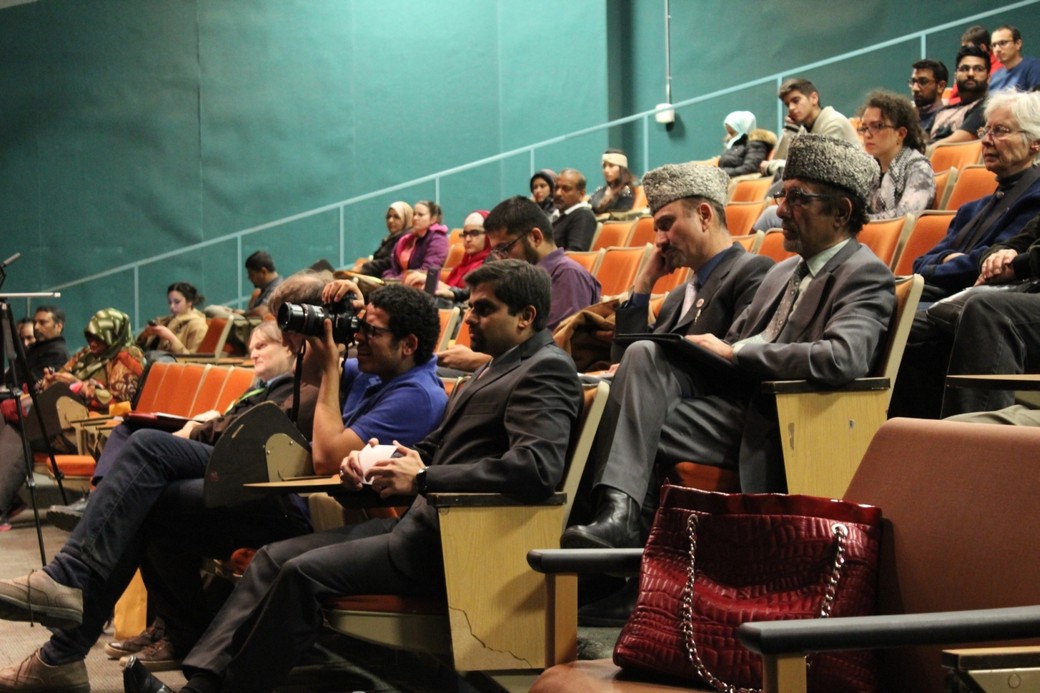
CrISIS: Imam Invites Students to Speak Love
Photo courtesy of the AMJ Group, University of Ottawa
At the entrance of the Alumni Auditorium at the University of Ottawa stands a booth with flyers, brochures and printed material on Islam. A black poster with white letters reads: “Love for all, Hatred for none.” The stage is set for Imam Imtiaz Ahmed, who will be launching Stop the CrISIS–a national campaign to prevent radicalization of youth by the Islamic State of Iraq and Syria (ISIS).

Imam Ahmed is the leader of Ottawa Ahmadiyya Muslim Jamaat (AMJ) community, which is a movement within Islam that emerged in the late 19th century. The Messiah Mirza Ghulam Ahmad, according to the prophecies of Mohammed, came to people to end religious wars and restore pure teachings of Islam.
Sarah Tal, a student studying globalization and international development, couldn’t miss the speech of Imam Ahmed tonight. Tal says she came to learn how to prevent people from stereotyping her religion as a violent one.
“It’s a big issue. I feel like the image of Islam is being destroyed by fanatics. It’s not what I feel represents Islam,” Tal says.
As people slowly fill the auditorium, Ahmed agreed to speak about the CrISIS campaign, about the role of education and the role of imams in preventing radicalization of youth in their communities.
The ISIS influence has not yet spread to Canada, the Imam says, but there is a risk of black flags surfacing in the country. ISIS has already proclaimed a caliphate in territories it controls in Syria and Iraq. The terrorist group constantly bombards youth around the world with messages through social media, calling them to join jihad against Westerners. In Britain, about 500 young people have already converted into ISIS fighters.

“In Canada, ISIS is not a crisis yet, but it has potential to become one. We want to make sure we stop it before it spreads,” Ahmed says.
Education is a key tool of the campaign against terrorist messages. The imam says, if young people are well-versed in Islamic teachings, they will see that the religion preaches peace, and has nothing in common with violence or terrorism.
“We want to say to youth: Jihadist websites, twitter feed, old recordings of Osama Bin Laden are not the source of Islamic teachings. We want to tell them that the source to Islamic teachings is the Holy Qur’an and life and character of Prophet Mohammad,” the Muslim leader says.
It is the responsibility of Imams and the government to prevent youth from falling prey in nets of radicals. So far, Ahmed says there is a lack of involvement of imams and Muslim leaders.

“We have to use our resources, whatever we have, to cope with this problem. At the end of the day, responsibility lies upon us [imams],” the Muslim leader says.
Over 125 years of its existence, the Ahmadiyya community didn’t have a single incident of terrorism or violence. In the Ahmadiyya community, children as young as six years old start learning about Islam, Imam Ahmed says. By the age of 16, they become aware of their faith and can recognize false messages of radicals.
The Muslim leader says the Ahmadiyya community also works closely with their youth engaging them in different activities. Youth help mosques with blood drive, food drive, and take part in spring clean-ups. The mosques hold discussions, question-and-answer sessions on contemporary issues. Communities organize sports events and take youth camping.
It’s all about teaching young people their religion, Ahmed says. So that in future, if any radical will try to grab them in their clutches, they can say:
“We know what our religion stands for. We know what Islam teaches, and we know what Islam doesn’t teach–so, thank you very much.”

Muneer Khan, a member of the Ahmadiyya Muslim Student Association at the University of Ottawa, helped organize the CrISIS event. He says terrorists use the Web and social media to lure young people into their army. Universities are prime targets too.
“We have to close all possible avenues, all the loopholes in the system for an individual with extremist views,” Muneer says.
After the terrorist attack on Parliament Hill, Muslim students at the University of Ottawa joined the national campaign Stop the CrISIS– the campaign that booked 45 venues in different locations in Ottawa, Montreal, Toronto and Vancouver.
Khan says about 80 Muslims and non-Muslims came to hear Imam Ahmed speak. After the event, many students expressed their interest in working with the Muslim group to stop extremism in their university.
“One of the students came to me after the event, he asked me whether the Ahmadiyya Muslim students will be willing to help stop an individual who is spreading hate messages,” Khan says.
Khan responded that the students are ready to work with anyone, or with any other student organization to prevent hate messages on campus.
“This is just the beginning of the campaign,” Muneer says. “Our goal is to have world peace. Until this goal is accomplished – we are not quitting.”
Sarah Tal has lived in Jordan for the past five years. After her return to Canada, she found the same country she once came to know: open and accepting. She says, terrorist attacks will not change Canada.
“There was a writing on the wall of the mosque that said: Muslims go home,” Tal says, recalling days after the Parliament Hill attack. “And then, there was a group of Canadians who gathered together to fix that. They’ve painted over that, and just wrote on the sign: You are home.”











